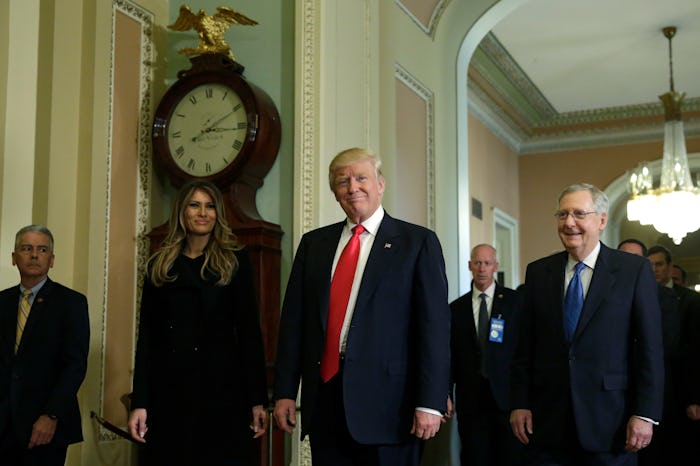
Options For Healthcare If Trump Abolishes Obamacare Once He Becomes President
President-elect Donald Trump hasn't always been forthcoming with details about what he actually intends to do after he's sworn in in January, but one thing he has been pretty clear about is his desire to dismantle the Affordable Care Act (ACA), otherwise known as Obamacare. During the second presidential debate, Trump said that "Obamacare is a disaster," and told his supporters he would "repeal it and replace it with something absolutely much less expensive," according to NPR. It's not clear exactly what the options for healthcare if Trump abolishes Obamacare will be, but based on what he's said, experts have described a few possible scenarios. And they might not be very welcome news for those who gained access to insurance as a result of the ACA.
Trump has said repealing Obamacare will be one of his top priorities as president, but it sounds like that actually won't be particularly easy for him to do. As Georgetown University Health Policy Institute research professor Jack Hoadley told NPR, "to get a true repeal and replace through, he needs 60 votes in the Senate," which is the minimum number required to overcome a filibuster. But unless Trump is specifically set on repealing, there are other, less complicated ways he could dismantle the ACA — mostly by making certain changes and leaving the rest as it is.
According to USA Today, instead of totally repealing, it's more likely that Trump will choose to reform Obamacare by eliminating only the mandates he is against — like the requirement that all Americans have to have insurance — and he may also eliminate the insurance subsidies that were designed to make plans more affordable. According to NPR, Trump has said that he may instead introduce tax-free health savings accounts that would allow people to save money for their own health care costs, and has also mentioned allowing insurers to sell policies across state lines in an attempt to make policies more competitive.
These changes could be welcome news for anyone who feels they are paying too much for health insurance under Obamacare right now, since they'll essentially have options to either opt out and save privately, or to pick from a bigger, potentially more competitive pool of policies. But the downside is that the requirement that all Americans buy into Obamacare, coupled with the income-based subsidies, is precisely what gave 25 million uninsured Americans healthcare under the ACA, according to Reuters. Since Obamacare has prevented insurance companies from denying coverage to those with pre-existing conditions (aka, the people who the insurance companies have to pay a lot to cover), having insurance coverage required for all Americans helped ensure there were also enough low-risk people to offset the cost. If those people are no longer required to opt-in (and Trump himself has said he won't take away the provision about pre-existing conditions), then it's likely, as Robert Wood Johnson Foundation insurance coverage team director Katherine Hempstead told USA Today, that "the expectation is that fewer people will be covered, and those who are will be paying more for less."
And that's not all. According to The Washington Post, repealing Obamacare could increase the federal deficit by upwards of $353 billion, while likely making those 25 million previously-uninsured Americans no longer able to afford and continue with their current policies. In other words, it's likely that healthcare options under Trump would improve for those who didn't really need Obamacare in the first place, while becoming more expensive for those currently relying on Obamacare for their healthcare coverage.
Depending on which camp you fall into, the good/bad news is that, even if Trump does go ahead and make these changes, it's unlikely that it will be felt in a significant way until at least 2018, according to Kaiser Health News. That's because, even when the Trump administration takes over, insurers currently providing coverage "are generally locked in contractually for 2017." As for what consumers should do if they are worried about potentially becoming uninsured? Washington and Lee University School of Law in Virginia emeritus professor Timothy Jost told Kaiser Health News that he “would advise people who are sick to get good coverage now and hang onto it.”
And that actually seems like a strategy that a lot of people are pursuing right now. According to Politico, over 100,000 enrolled in an Obamacare plan the day after the election, which marked the biggest sign-up since open enrollment began on Nov. 1. While positive changes could be on the horizon for those who felt like Obamacare wasn't meeting their needs, the uncertainty over what the options will be for everyone else suggests that taking as many precautions as they can ahead of the shift in government could be their wisest option at this point.